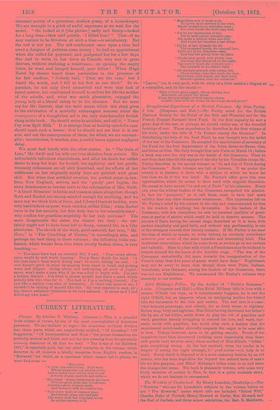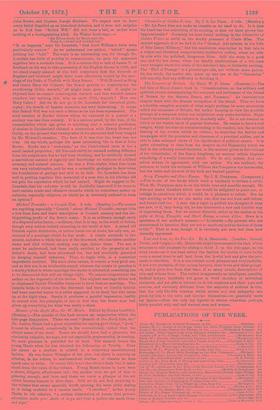The Worthies of Cumberland. By Henry Lonsdale, (Routledge.)—The "Worthies who
are Dr. Lonsdale's subjects in the volume before us are "The Howards," under which title are included "Belted Will," Charles, Duke of Norfolk, Henry Howard of Corby, Mrs. Howard, and the Earl of Carlisle, and three minor celebrities, the Rev. R. Matthews,
John Hooke, and Captain Joseph Huddart. We expect now to have every belief dispelled as an historical delusion, and it does not surprise us to find that "Belted Will" did not wear a belt, or rather wore nothing of a distinguishing kind. Sir Walter Scott says :—
"His Bilboa-blade, by March-men felt, Hang in a broad and studded belt."
It so happens," says Dr. Lonsdale, "that Lord William's belt were particularly narrow." As we understand our author, " belted " means nothing but "bold." The topic is an interesting one, for though Dr. Lonsdale has little of novelty to communicate, he puts his materials together into a readable form. It is a curious slip to talk of James V. of Scotland on his way to take possession of the English throne in 1603, and we stand simply amazed at the bold conjecture that the discords of England and Scotland might have been effectively healed by the mar- t siege of the Doke of Norfolk with Mary Stuart. " WithHoward as King and Queen Mary for Consort, the Saxon gravity t3 counterpoise the overflowing Celtic warmth," all might have gone well. It might be objected that we cannot counterpoise warmth and that warmth cannot overflow, but waiving this, why on earth Celtic warmth? How was Mary Celtic ? But we do not go to Dr. Lonsdale for historical philo- sophy; his details of bygone manners are very interesting. It seems that Belted Will was not such a Draco as he has been represented. The total number of Border thieves whom he executed in a quarter of a century was less than seventy. It is a carious proof, by the way, of the respectability which age gives to anything, that a country gentleman of station in Cumberland claimed a connection with Henry Howard of Corby, on the ground that twenty-nine of his ancestors had been hanged by Mr. Howard's ancestor. The best of it was that the boast was not true. On the whole, perhaps the most interesting life is that of John Hooke. Rooke was a "statesman," as the Cumberland term is for a small landed proprietor; till five-and-thirty he seemed nothing different from his neighbours, but he had been thinking, and he suddenly showed a marvellous amount of sagacity and knowledge on subjects of political economy and natural science. He was a Free-trader, when free-trade was very unfashionable, and he was a scientific geologist in days when the foundations of geology had still to be laid. Dr. Lonsdale has done well in putting together this memorial of a man who in his lifetime did not gain the reputation which he had earned. Might we suggest to Dr. Lonsdale that his volumes would be decidedly improved if he were to omit certain crude and offensive remarks which he sometimes makes on subjects, especially religious, on which he is obviously unfitted to form an opinion?



































 Previous page
Previous page